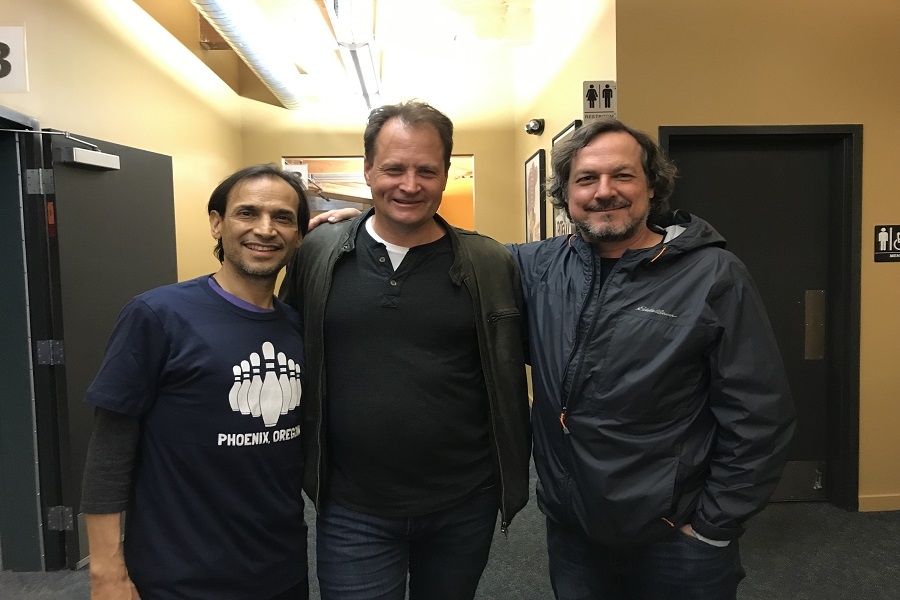The ongoing Writer’s Guild of America strike threatens thousands of Oregon jobs and over $100 million in revenue.
Large-scale film production has stopped completely in Oregon, due to the Writer’s Guild of America strike, according to Tim Williams, executive director of the Oregon Office of Film & Video.
More than 11,000 people are currently on strike with the WGA, leading scripted series and late-night programs like The Tonight Show and Last Week Tonight to halt production. While the most dramatic impacts have been in California and New York, Williams says the strike has also put an end to productions in Oregon.
As of mid-July, the writers’ strike had dragged on for more than two months, and performers’ union SAG-AFTRA was poised to join writers on the picket line. SAG-AFTRA had already voted to strike beginning July 1, but pushed back the strike date to July 12. If the union fails to reach a deal by 11:59 p.m. Wednesday, actors will join writers on the picket lines — a move likely to disrupt even more productions. It would be the first time screen actors have struck since 1980.

Williams did not say how many Oregon film and television productions shut down when the WGA strike began in May, but a look at last year’s numbers can give a sense of the potential impact.
The Oregon Film Office recorded $117 million in film, television, commercial and media production spending during the fiscal year 2021-2022, producing more than 30 film projects through Oregon’s film incentive, which includes any project spending $1 million or more, supporting 3,000 jobs and bringing out-of-state money to local vendors.
“We have had a few smaller indie productions but even those are wrapping up and/or delaying their starts now,” Williams told Oregon Business over email.
He says Oregon’s animation studios don’t appear to have been impacted, since animation’s long, meticulous process means scripts are locked earlier in the development process.
David Cress, producer of Oregon-made TV series Shrill and Portlandia, confirmed the strike has shut down production of all scripted series in the state. And he’s not optimistic the strike will end any time soon. He likened the ongoing strike to a yellow flag in race car driving – putting the brakes on studio spending and leaving steaming services all a chance to profit without having to compete.
“The strike is like a yellow flag for these new streaming services to start profiting from the service but not laying out any new big expensive shows,” Cress tells OB over email. He says this profit period means streaming services can take a break from fierce competition without losing any market share, which may draw out negotiations and work against writers.

Cress says television networks’ rush to start their own streaming services compounds the situation. He says new streaming operations are under tremendous pressure by stockholders to prove they can be profitable, and that film production was ramping down prior to the strike.
“It’s hard to see the immediate incentive the studios and streamers have to resolve this quickly,” writes Cress.
Strikers are concerned about the changes streaming services like Netflix have made to the industry, including not paying writers residuals, the portion of money writers traditionally receive when their shows rerun on television. Other concerns include career development opportunities for newer writers, some of who claim they can’t make a living wage writing for television.
Oregon filmmaker Jason Wilkinson says the writers’ strike has made him reconsider career paths, veering away from screenwriting and towards directing. Wilkinson currently makes his income from commercial shoots, and it doesn’t make much financial sense to continue as a screenwriter given the landscape.
“It seems like writers are not getting the attention or the deal that they need to make a living at it. Just going over the issues, it’s compelling. They’re clearly in the right.” says Wilkinson, who adds that he has empathy for the predicament studios are in as well.
“I understand that everybody’s having this weird crunch. People across the industry are getting laid off, not just as writers,” says Wilkinson. “It’s just convenient all this is happening at the same time. It very much plays into that cliché — when it rains, it pours.”
To subscribe to Oregon Business, click here.








